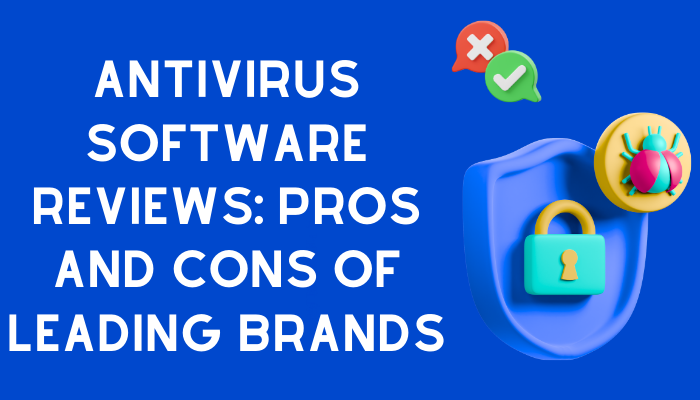Antivirus software is indispensable in safeguarding your devices against malicious threats. In the domain of cybersecurity, the meticulous assessment and comparison of leading antivirus solutions underscore pivotal insights. These evaluations illuminate merits like real-time protection, intuitive interfaces, and auxiliary features such as firewall protection and anti-phishing tools. However, nuances encompass considerations of resource consumption, false positives, and subscription expenses. Grasping these subtleties empowers users to discerningly select antivirus software aligning with their requisites.
Antivirus Software Reviews: Pros and Cons of Leading Brands
Within the cybersecurity realm, selecting apt antivirus software assumes paramount significance in fortifying your digital assets against burgeoning threats. Presented herein is an exhaustive critique of eminent antivirus brands, delineating their merits and demerits.
- Norton Antivirus
Pros:
- Robust malware detection capabilities.
- Comprehensive suite of security features.
- Intuitive user interface.
Cons:
- Potential resource intensiveness affecting system performance.
- Elevated subscription costs vis-a-vis alternative options.
- Occasional false positives reported by users.
- McAfee Antivirus
Pros:
- Superlative malware protection.
- Diverse security features, including firewall and identity theft protection.
- Compatibility with various devices and operating systems.
Cons:
- Cumbersome installation process for certain users.
- Resource-intensive, potentially causing slowdowns on older systems.
- Confusing subscription renewal procedures.
- Avast Antivirus
Pros:
- Free version endowed with rudimentary protection features.
- Robust malware detection rates.
- Provision of supplementary tools such as Wi-Fi inspector and password manager.
Cons:
- Advertisements and pop-ups in the free version, potentially intrusive.
- Periodic performance issues reported post updates.
- Limited customer support for free-tier users.
- Bitdefender Antivirus
Pros:
- Exemplary malware detection and prevention capabilities.
- Minimal impact on system performance.
- Extensive feature set, including ransomware protection and VPN.
Cons:
- Pricing may surpass alternatives.
- Advanced functionalities restricted to premium tiers.
- Occasional compatibility issues with select software applications.
In summation, prudent selection of antivirus software entails meticulous scrutiny of features, performance, and user experience. While each brand boasts strengths and weaknesses, the ultimate choice hinges upon individual inclinations and specific security exigencies. Pore over comprehensive research and user testimonials to make informed decisions, ensuring robust protection against digital perils.
In essence, the discourse on antivirus software reviews furnishes invaluable insights into the prowess and pitfalls of premier brands, empowering users to judiciously safeguard their digital assets.
FAQ
- What is the function of antivirus software and its operational mechanics?
Antivirus software is meticulously crafted to discern, preempt, and expunge pernicious software entities, including viruses, malware, and spyware, from computing apparatuses and analogous devices.
- What is the significance of antivirus software in computer fortification?
Antivirus software assumes paramount importance in the realm of computer security, acting as a bulwark against digital intrusions and preserving the sanctity of sensitive data repositories.
- What is the recommended frequency for updating antivirus software?
It is prudent to maintain a regimen of regular updates for antivirus software, ideally on a diurnal basis or whenever substantive updates are available.
- What attributes should one seek in antivirus software?
Crucial attributes to scrutinize in antivirus software encompass real-time surveillance, malware identification, and proactive remediation measures.
- Is free antivirus software viable, or is a paid subscription requisite?
While free antivirus software proffers rudimentary defense mechanisms, paid subscriptions often furnish augmented functionalities and comprehensive security arsenals.
- What is the impact of antivirus software on computational performance?
Antivirus software may engender discernible impacts on computational performance, albeit its indispensable role in fortifying digital environs against malevolent incursions.
- Is antivirus software indispensable for Mac or Linux systems?
Though Mac and Linux platforms encounter diminished susceptibility to malware vis-a-vis Windows, the adoption of antivirus software is still advocated to preempt latent threats and vulnerabilities.
- Can antivirus software combat all manifestations of cyber threats?
While antivirus software serves as a formidable bulwark against myriad cyber threats, its efficacy is not infallible and may fall short in detecting nascent or zero-day threats, necessitating auxiliary security protocols.
- What protocol should one adhere to upon detection of a threat by antivirus software?
Upon detection of a threat by antivirus software, it behooves the user to diligently adhere to prescribed protocols, which may include quarantining or expunging the threat and ensuring the software is contemporaneously updated for enhanced security efficacy.
- How can one discern the optimal antivirus software solution tailored to individual exigencies?
The discernment of optimal antivirus software hinges upon multifarious considerations, encompassing operating system compatibility, financial constraints, desired functionalities, impartial evaluations, and user testimonials, culminating in the selection of a solution commensurate with bespoke security requisites.










